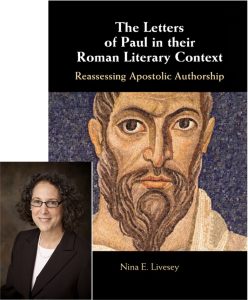
Today I received a review copy from Cambridge University Press of Nina E. Livesey’s The Letters of Paul in their Roman Literary Context: Reassessing Apostolic Authorship. I have already read the Introduction and Chapter 4 and highlighted along the way a few dozen other works referenced by Livesey to follow up. But what I found most inviting is that quite a few other references I have already posted about — and in some cases translated — here on Vridar. It is encouraging to meet a friend who likes and has found value in my other friends.
The first reference that stands out is Patricia Rosenmeyer. I posted on one of Rosenmeyer’s works in 2006 and it is one Livesey refers to often (as I also have done in subsequent posts):
Livesey references many scholars I have discussed here (some more extensively than others) but some names stand out as being more “radical” than others — to name but a handful some long-term blog readers may recognize:
- Bruno Bauer — whose relevant works discussed by Livesey I translated and made available here: see his Pauline Letters and Christ and the Caesars. Livesey writes of BB, “his arguments are more sophisticated than those typically found in current Pauline scholarship” (19). Nice.
- Paul Louis Couchoud — a very nice surprise to see him make an appearance
- Rudolf Steck — my translation of one of his works is online at https://vridar.info/
- Joseph Tyson — I posted at length on his work on Marcion and Luke-Acts
- Herman Detering — whose scholarship is vastly under-rated by at least one prominent name who notably failed to do a basic Bayesian analysis of his work (see Staged Forgeries — another work I have translated)
- Markus Vinzent
- Richard Pervo
- Boyarin, Daniel — of whom Larry Hurtado expressed distinct discomfort for his forays into New Testament studies
Nina Livesey argues that the Pauline letters all date from the mid second century — after the Bar Kochba War.
I feel a little ashamed that till now I have only allowed myself to wonder if all of the New Testament writings should be dated to the post Bar Kochba war period. Livesey takes that step boldly.
Drawing on Rosenmeyer and numerous others I look forward to reading Livesey contextualizes the Pauline letters within the ancient custom of “schools” and teachers writing letters in the name of others in order to teach and persuade. Paul’s letters are not the product of a “wandering charismatic preacher” but of someone belonging to the wealthy elite.
Such a portrait, however, poorly suits an individual both trained and socially positioned to produce such letters. On the other hand, there is ample evidence of creative literary activity and production in schools (haereses). As I argue in what follows, a second-century social and political context and a school setting, such as that of Marcion, are suggestive of a viable location for the creation of doctrinal exhortative letters written in the name of the Apostle Paul. (xif)
And the thesis extends beyond the letters:
While certainly a contentious and debated issue, the dating of NT writings plays an important role in my thesis. Not only Acts, but also the canonical Gospels are more recently considered not first- but second century writings. If we consider – as did the Dutch Radicals – that the Pauline letters were produced alongside of and in a complex and dynamic relationship with the Gospels and Acts, the forward shift in the dating of the latter lends further support to a second-century provenance of the letters. (27f)
So it’s back to Marcion and the post Bar Kochba era for “everything”.
“Christian” teachers arrived in Rome in the wake of the Bar Kokhba revolt and established schools under Roman authority near one other. “Christian” literature, including gospel texts, flourished during this time, with compositions reflecting a post-Jewish temple and post-Judaea social and political reality. Marcion’s publication of what has been interpreted as the First New Testament, consisting of a gospel (Evangelion) and a collection of Pauline letters (Apostolikon), is likely one of the earliest among these compositions. (251)
I look forward very much to reading the work in full and posting about it as opportunity permits.
Livesey, Nina E. The Letters of Paul in Their Roman Literary Context: Reassessing Apostolic Authorship. Cambridge: Cambridge University Press, 2024.
